Legal Aspects of International Trade and Enterprise: An Analysis
VerifiedAdded on 2023/01/04
|11
|2559
|39
Report
AI Summary
This report provides a detailed analysis of the legal aspects of international trade and enterprise, with a specific focus on the multinational luxury goods conglomerate LVMH S.A. The report begins with an introduction to LVMH, its business segments, and its global presence. It then delves into the legislative and regulatory frameworks affecting the company's operations, including the Corporations Act 2001, taxation policies, market surveillance regulations, environmental protection legislation, privacy laws, and consumer laws in Australia. The report also examines the impact of political regulations, such as trade policies and government initiatives, on LVMH's business. Furthermore, it explores treaties, conventions, and agreements that affect LVMH's products, including the Multilateral Convention to Implement Treaty Measures to Prevent Base Erosion and Profit Shifting and various business agreements with other companies and governments, highlighting their implications for the company's operations and market position. The report concludes by summarizing the key findings and implications of the legal and regulatory environment for LVMH's international trade activities.
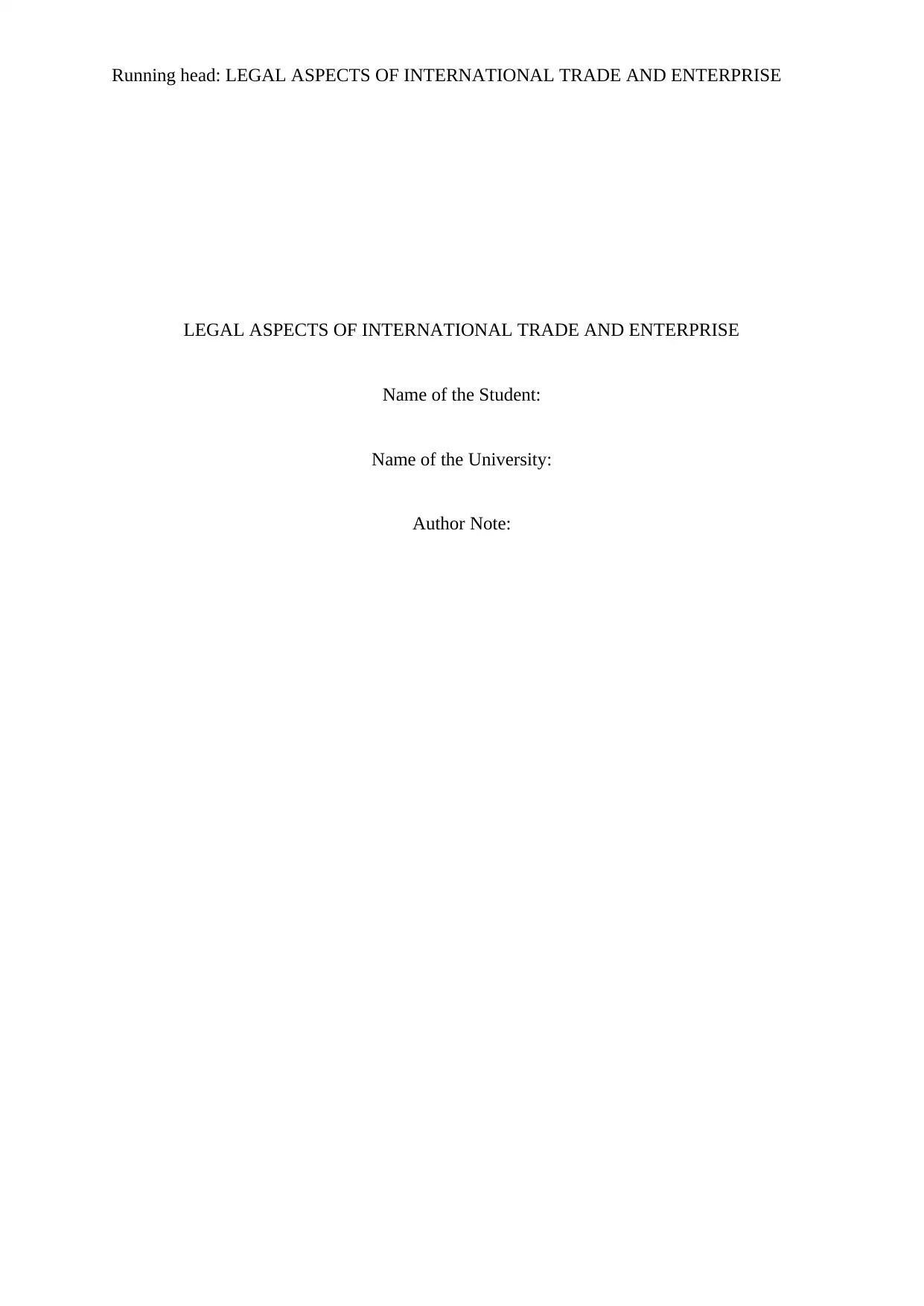
Running head: LEGAL ASPECTS OF INTERNATIONAL TRADE AND ENTERPRISE
LEGAL ASPECTS OF INTERNATIONAL TRADE AND ENTERPRISE
Name of the Student:
Name of the University:
Author Note:
LEGAL ASPECTS OF INTERNATIONAL TRADE AND ENTERPRISE
Name of the Student:
Name of the University:
Author Note:
Paraphrase This Document
Need a fresh take? Get an instant paraphrase of this document with our AI Paraphraser
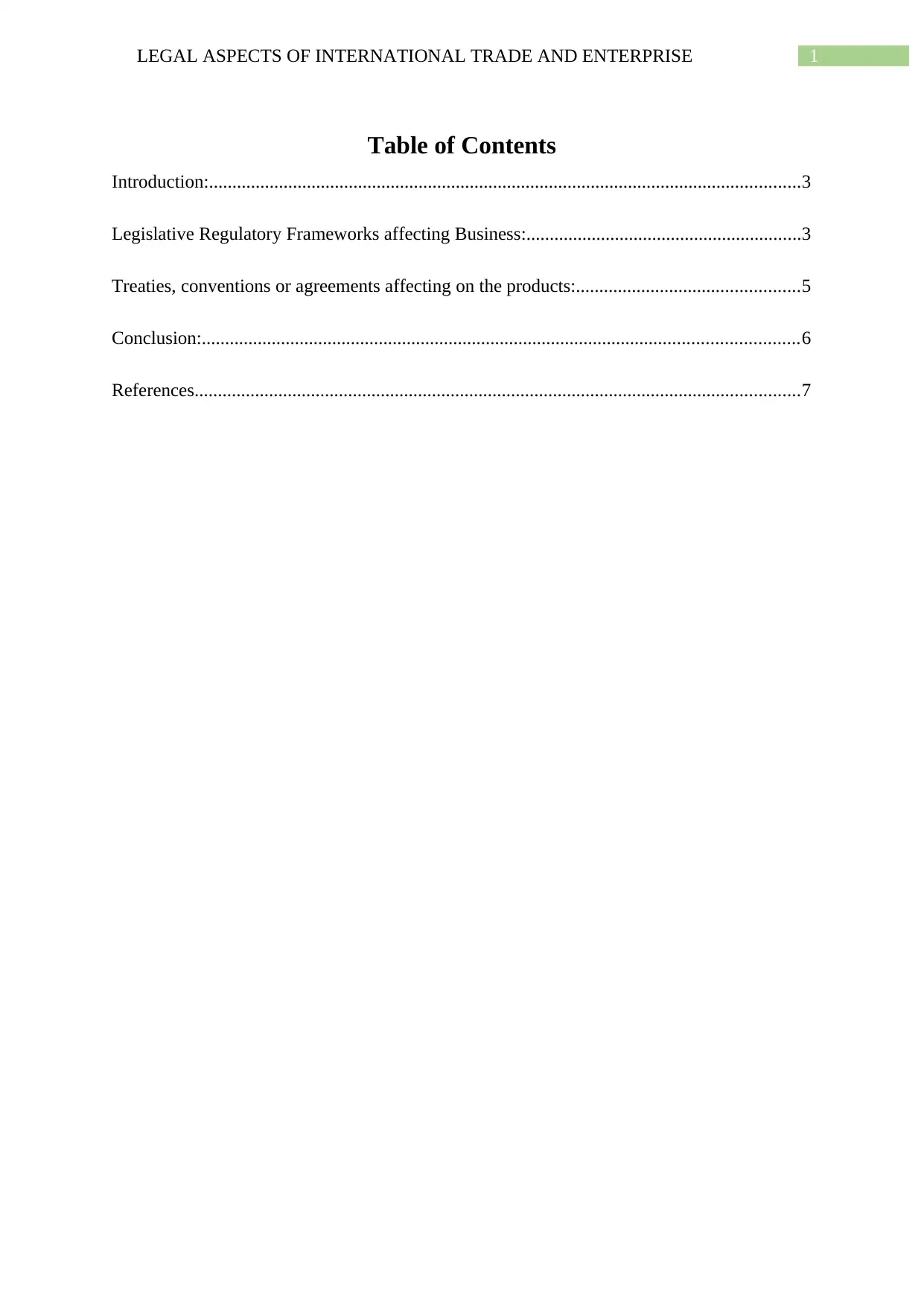
1LEGAL ASPECTS OF INTERNATIONAL TRADE AND ENTERPRISE
Table of Contents
Introduction:...............................................................................................................................3
Legislative Regulatory Frameworks affecting Business:...........................................................3
Treaties, conventions or agreements affecting on the products:................................................5
Conclusion:................................................................................................................................6
References..................................................................................................................................7
Table of Contents
Introduction:...............................................................................................................................3
Legislative Regulatory Frameworks affecting Business:...........................................................3
Treaties, conventions or agreements affecting on the products:................................................5
Conclusion:................................................................................................................................6
References..................................................................................................................................7
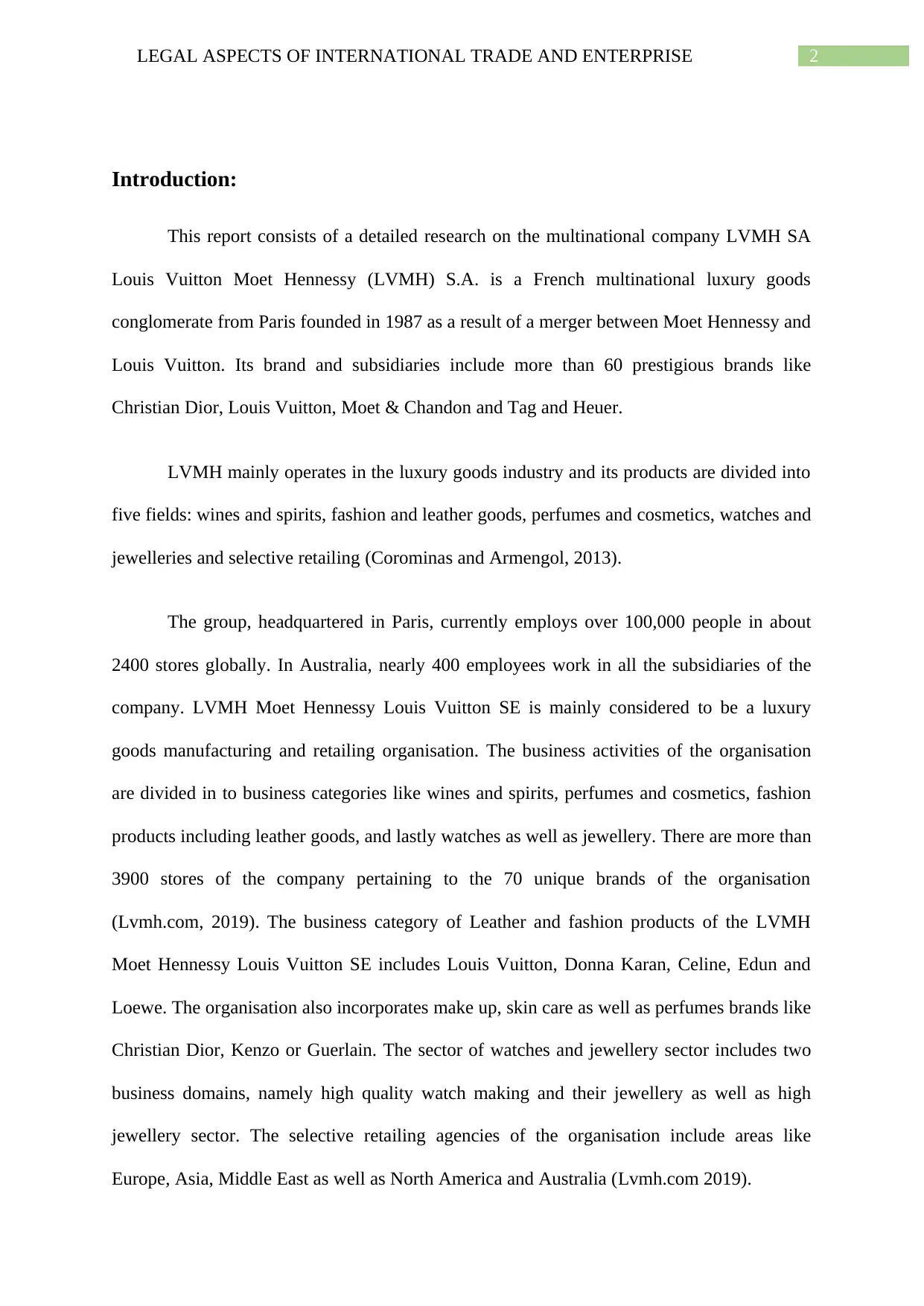
2LEGAL ASPECTS OF INTERNATIONAL TRADE AND ENTERPRISE
Introduction:
This report consists of a detailed research on the multinational company LVMH SA
Louis Vuitton Moet Hennessy (LVMH) S.A. is a French multinational luxury goods
conglomerate from Paris founded in 1987 as a result of a merger between Moet Hennessy and
Louis Vuitton. Its brand and subsidiaries include more than 60 prestigious brands like
Christian Dior, Louis Vuitton, Moet & Chandon and Tag and Heuer.
LVMH mainly operates in the luxury goods industry and its products are divided into
five fields: wines and spirits, fashion and leather goods, perfumes and cosmetics, watches and
jewelleries and selective retailing (Corominas and Armengol, 2013).
The group, headquartered in Paris, currently employs over 100,000 people in about
2400 stores globally. In Australia, nearly 400 employees work in all the subsidiaries of the
company. LVMH Moet Hennessy Louis Vuitton SE is mainly considered to be a luxury
goods manufacturing and retailing organisation. The business activities of the organisation
are divided in to business categories like wines and spirits, perfumes and cosmetics, fashion
products including leather goods, and lastly watches as well as jewellery. There are more than
3900 stores of the company pertaining to the 70 unique brands of the organisation
(Lvmh.com, 2019). The business category of Leather and fashion products of the LVMH
Moet Hennessy Louis Vuitton SE includes Louis Vuitton, Donna Karan, Celine, Edun and
Loewe. The organisation also incorporates make up, skin care as well as perfumes brands like
Christian Dior, Kenzo or Guerlain. The sector of watches and jewellery sector includes two
business domains, namely high quality watch making and their jewellery as well as high
jewellery sector. The selective retailing agencies of the organisation include areas like
Europe, Asia, Middle East as well as North America and Australia (Lvmh.com 2019).
Introduction:
This report consists of a detailed research on the multinational company LVMH SA
Louis Vuitton Moet Hennessy (LVMH) S.A. is a French multinational luxury goods
conglomerate from Paris founded in 1987 as a result of a merger between Moet Hennessy and
Louis Vuitton. Its brand and subsidiaries include more than 60 prestigious brands like
Christian Dior, Louis Vuitton, Moet & Chandon and Tag and Heuer.
LVMH mainly operates in the luxury goods industry and its products are divided into
five fields: wines and spirits, fashion and leather goods, perfumes and cosmetics, watches and
jewelleries and selective retailing (Corominas and Armengol, 2013).
The group, headquartered in Paris, currently employs over 100,000 people in about
2400 stores globally. In Australia, nearly 400 employees work in all the subsidiaries of the
company. LVMH Moet Hennessy Louis Vuitton SE is mainly considered to be a luxury
goods manufacturing and retailing organisation. The business activities of the organisation
are divided in to business categories like wines and spirits, perfumes and cosmetics, fashion
products including leather goods, and lastly watches as well as jewellery. There are more than
3900 stores of the company pertaining to the 70 unique brands of the organisation
(Lvmh.com, 2019). The business category of Leather and fashion products of the LVMH
Moet Hennessy Louis Vuitton SE includes Louis Vuitton, Donna Karan, Celine, Edun and
Loewe. The organisation also incorporates make up, skin care as well as perfumes brands like
Christian Dior, Kenzo or Guerlain. The sector of watches and jewellery sector includes two
business domains, namely high quality watch making and their jewellery as well as high
jewellery sector. The selective retailing agencies of the organisation include areas like
Europe, Asia, Middle East as well as North America and Australia (Lvmh.com 2019).
⊘ This is a preview!⊘
Do you want full access?
Subscribe today to unlock all pages.

Trusted by 1+ million students worldwide
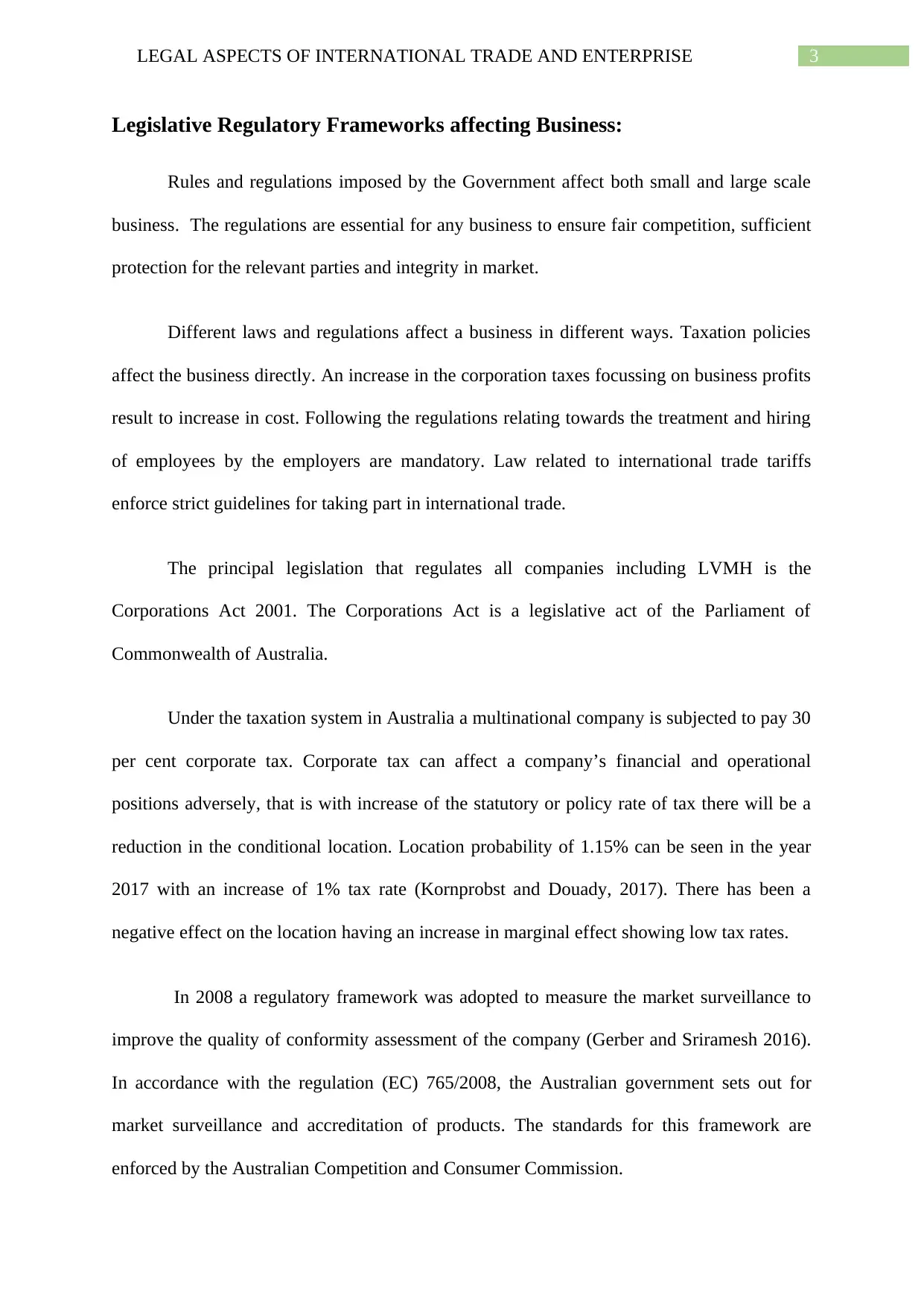
3LEGAL ASPECTS OF INTERNATIONAL TRADE AND ENTERPRISE
Legislative Regulatory Frameworks affecting Business:
Rules and regulations imposed by the Government affect both small and large scale
business. The regulations are essential for any business to ensure fair competition, sufficient
protection for the relevant parties and integrity in market.
Different laws and regulations affect a business in different ways. Taxation policies
affect the business directly. An increase in the corporation taxes focussing on business profits
result to increase in cost. Following the regulations relating towards the treatment and hiring
of employees by the employers are mandatory. Law related to international trade tariffs
enforce strict guidelines for taking part in international trade.
The principal legislation that regulates all companies including LVMH is the
Corporations Act 2001. The Corporations Act is a legislative act of the Parliament of
Commonwealth of Australia.
Under the taxation system in Australia a multinational company is subjected to pay 30
per cent corporate tax. Corporate tax can affect a company’s financial and operational
positions adversely, that is with increase of the statutory or policy rate of tax there will be a
reduction in the conditional location. Location probability of 1.15% can be seen in the year
2017 with an increase of 1% tax rate (Kornprobst and Douady, 2017). There has been a
negative effect on the location having an increase in marginal effect showing low tax rates.
In 2008 a regulatory framework was adopted to measure the market surveillance to
improve the quality of conformity assessment of the company (Gerber and Sriramesh 2016).
In accordance with the regulation (EC) 765/2008, the Australian government sets out for
market surveillance and accreditation of products. The standards for this framework are
enforced by the Australian Competition and Consumer Commission.
Legislative Regulatory Frameworks affecting Business:
Rules and regulations imposed by the Government affect both small and large scale
business. The regulations are essential for any business to ensure fair competition, sufficient
protection for the relevant parties and integrity in market.
Different laws and regulations affect a business in different ways. Taxation policies
affect the business directly. An increase in the corporation taxes focussing on business profits
result to increase in cost. Following the regulations relating towards the treatment and hiring
of employees by the employers are mandatory. Law related to international trade tariffs
enforce strict guidelines for taking part in international trade.
The principal legislation that regulates all companies including LVMH is the
Corporations Act 2001. The Corporations Act is a legislative act of the Parliament of
Commonwealth of Australia.
Under the taxation system in Australia a multinational company is subjected to pay 30
per cent corporate tax. Corporate tax can affect a company’s financial and operational
positions adversely, that is with increase of the statutory or policy rate of tax there will be a
reduction in the conditional location. Location probability of 1.15% can be seen in the year
2017 with an increase of 1% tax rate (Kornprobst and Douady, 2017). There has been a
negative effect on the location having an increase in marginal effect showing low tax rates.
In 2008 a regulatory framework was adopted to measure the market surveillance to
improve the quality of conformity assessment of the company (Gerber and Sriramesh 2016).
In accordance with the regulation (EC) 765/2008, the Australian government sets out for
market surveillance and accreditation of products. The standards for this framework are
enforced by the Australian Competition and Consumer Commission.
Paraphrase This Document
Need a fresh take? Get an instant paraphrase of this document with our AI Paraphraser
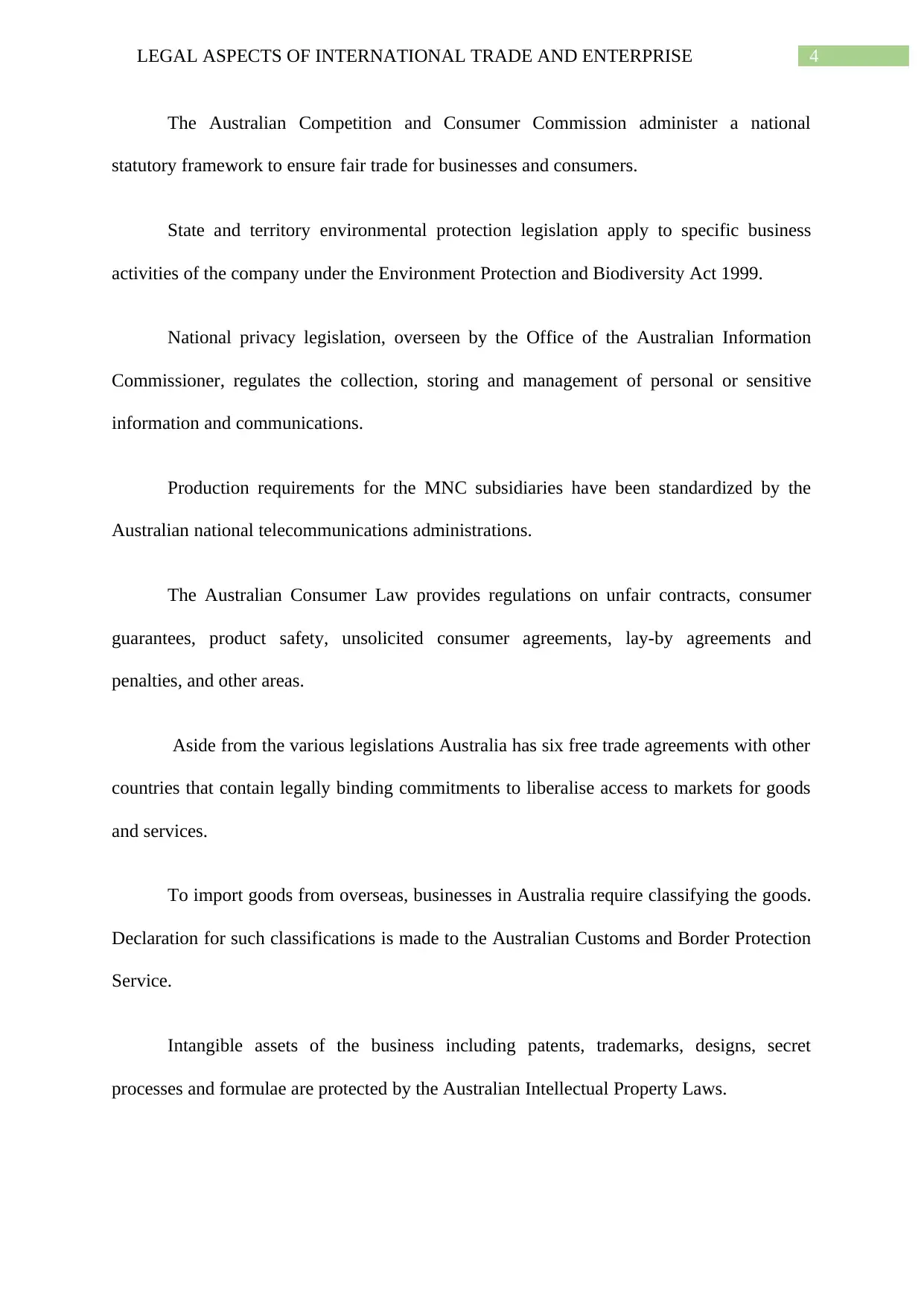
4LEGAL ASPECTS OF INTERNATIONAL TRADE AND ENTERPRISE
The Australian Competition and Consumer Commission administer a national
statutory framework to ensure fair trade for businesses and consumers.
State and territory environmental protection legislation apply to specific business
activities of the company under the Environment Protection and Biodiversity Act 1999.
National privacy legislation, overseen by the Office of the Australian Information
Commissioner, regulates the collection, storing and management of personal or sensitive
information and communications.
Production requirements for the MNC subsidiaries have been standardized by the
Australian national telecommunications administrations.
The Australian Consumer Law provides regulations on unfair contracts, consumer
guarantees, product safety, unsolicited consumer agreements, lay-by agreements and
penalties, and other areas.
Aside from the various legislations Australia has six free trade agreements with other
countries that contain legally binding commitments to liberalise access to markets for goods
and services.
To import goods from overseas, businesses in Australia require classifying the goods.
Declaration for such classifications is made to the Australian Customs and Border Protection
Service.
Intangible assets of the business including patents, trademarks, designs, secret
processes and formulae are protected by the Australian Intellectual Property Laws.
The Australian Competition and Consumer Commission administer a national
statutory framework to ensure fair trade for businesses and consumers.
State and territory environmental protection legislation apply to specific business
activities of the company under the Environment Protection and Biodiversity Act 1999.
National privacy legislation, overseen by the Office of the Australian Information
Commissioner, regulates the collection, storing and management of personal or sensitive
information and communications.
Production requirements for the MNC subsidiaries have been standardized by the
Australian national telecommunications administrations.
The Australian Consumer Law provides regulations on unfair contracts, consumer
guarantees, product safety, unsolicited consumer agreements, lay-by agreements and
penalties, and other areas.
Aside from the various legislations Australia has six free trade agreements with other
countries that contain legally binding commitments to liberalise access to markets for goods
and services.
To import goods from overseas, businesses in Australia require classifying the goods.
Declaration for such classifications is made to the Australian Customs and Border Protection
Service.
Intangible assets of the business including patents, trademarks, designs, secret
processes and formulae are protected by the Australian Intellectual Property Laws.
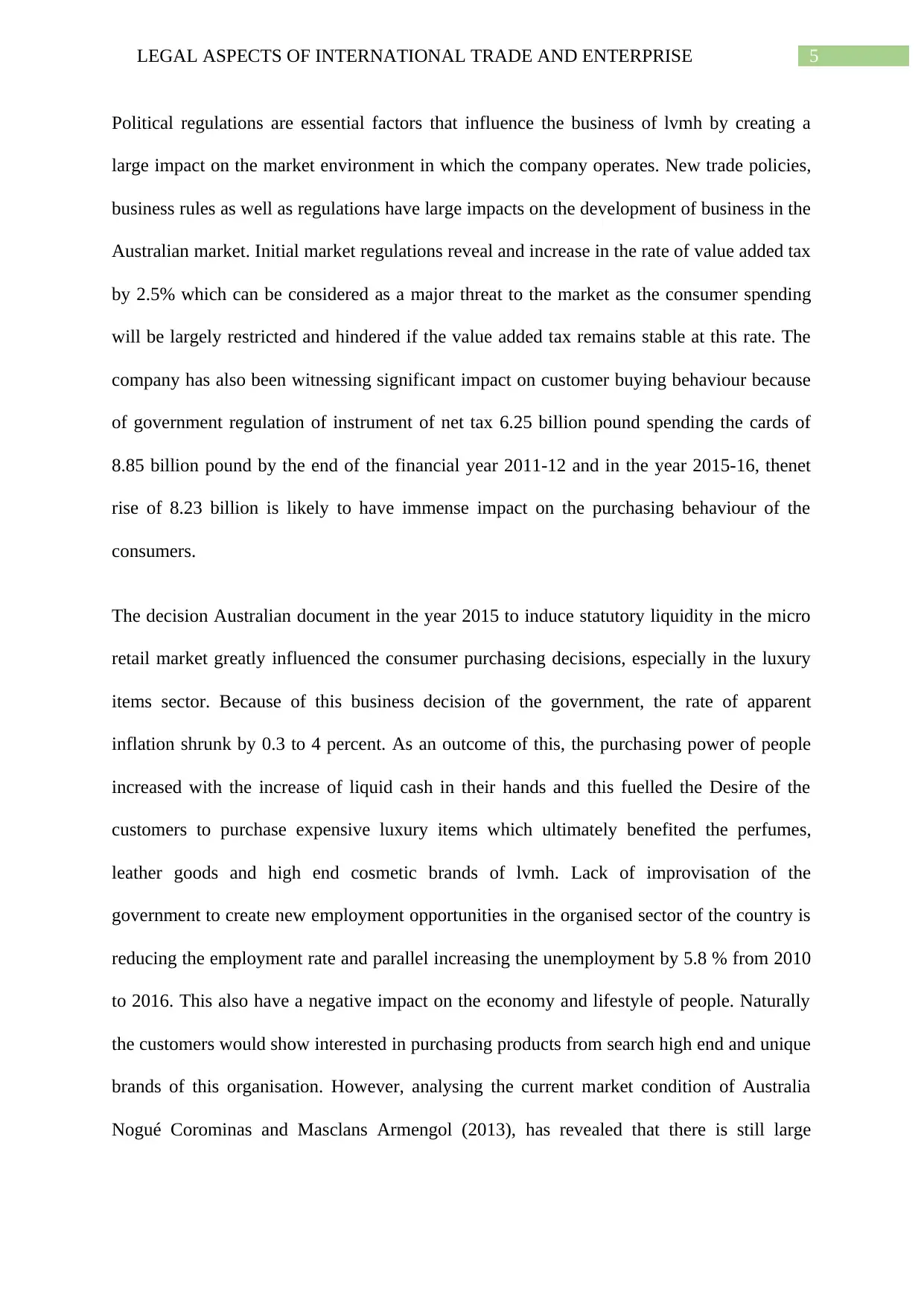
5LEGAL ASPECTS OF INTERNATIONAL TRADE AND ENTERPRISE
Political regulations are essential factors that influence the business of lvmh by creating a
large impact on the market environment in which the company operates. New trade policies,
business rules as well as regulations have large impacts on the development of business in the
Australian market. Initial market regulations reveal and increase in the rate of value added tax
by 2.5% which can be considered as a major threat to the market as the consumer spending
will be largely restricted and hindered if the value added tax remains stable at this rate. The
company has also been witnessing significant impact on customer buying behaviour because
of government regulation of instrument of net tax 6.25 billion pound spending the cards of
8.85 billion pound by the end of the financial year 2011-12 and in the year 2015-16, thenet
rise of 8.23 billion is likely to have immense impact on the purchasing behaviour of the
consumers.
The decision Australian document in the year 2015 to induce statutory liquidity in the micro
retail market greatly influenced the consumer purchasing decisions, especially in the luxury
items sector. Because of this business decision of the government, the rate of apparent
inflation shrunk by 0.3 to 4 percent. As an outcome of this, the purchasing power of people
increased with the increase of liquid cash in their hands and this fuelled the Desire of the
customers to purchase expensive luxury items which ultimately benefited the perfumes,
leather goods and high end cosmetic brands of lvmh. Lack of improvisation of the
government to create new employment opportunities in the organised sector of the country is
reducing the employment rate and parallel increasing the unemployment by 5.8 % from 2010
to 2016. This also have a negative impact on the economy and lifestyle of people. Naturally
the customers would show interested in purchasing products from search high end and unique
brands of this organisation. However, analysing the current market condition of Australia
Nogué Corominas and Masclans Armengol (2013), has revealed that there is still large
Political regulations are essential factors that influence the business of lvmh by creating a
large impact on the market environment in which the company operates. New trade policies,
business rules as well as regulations have large impacts on the development of business in the
Australian market. Initial market regulations reveal and increase in the rate of value added tax
by 2.5% which can be considered as a major threat to the market as the consumer spending
will be largely restricted and hindered if the value added tax remains stable at this rate. The
company has also been witnessing significant impact on customer buying behaviour because
of government regulation of instrument of net tax 6.25 billion pound spending the cards of
8.85 billion pound by the end of the financial year 2011-12 and in the year 2015-16, thenet
rise of 8.23 billion is likely to have immense impact on the purchasing behaviour of the
consumers.
The decision Australian document in the year 2015 to induce statutory liquidity in the micro
retail market greatly influenced the consumer purchasing decisions, especially in the luxury
items sector. Because of this business decision of the government, the rate of apparent
inflation shrunk by 0.3 to 4 percent. As an outcome of this, the purchasing power of people
increased with the increase of liquid cash in their hands and this fuelled the Desire of the
customers to purchase expensive luxury items which ultimately benefited the perfumes,
leather goods and high end cosmetic brands of lvmh. Lack of improvisation of the
government to create new employment opportunities in the organised sector of the country is
reducing the employment rate and parallel increasing the unemployment by 5.8 % from 2010
to 2016. This also have a negative impact on the economy and lifestyle of people. Naturally
the customers would show interested in purchasing products from search high end and unique
brands of this organisation. However, analysing the current market condition of Australia
Nogué Corominas and Masclans Armengol (2013), has revealed that there is still large
⊘ This is a preview!⊘
Do you want full access?
Subscribe today to unlock all pages.

Trusted by 1+ million students worldwide
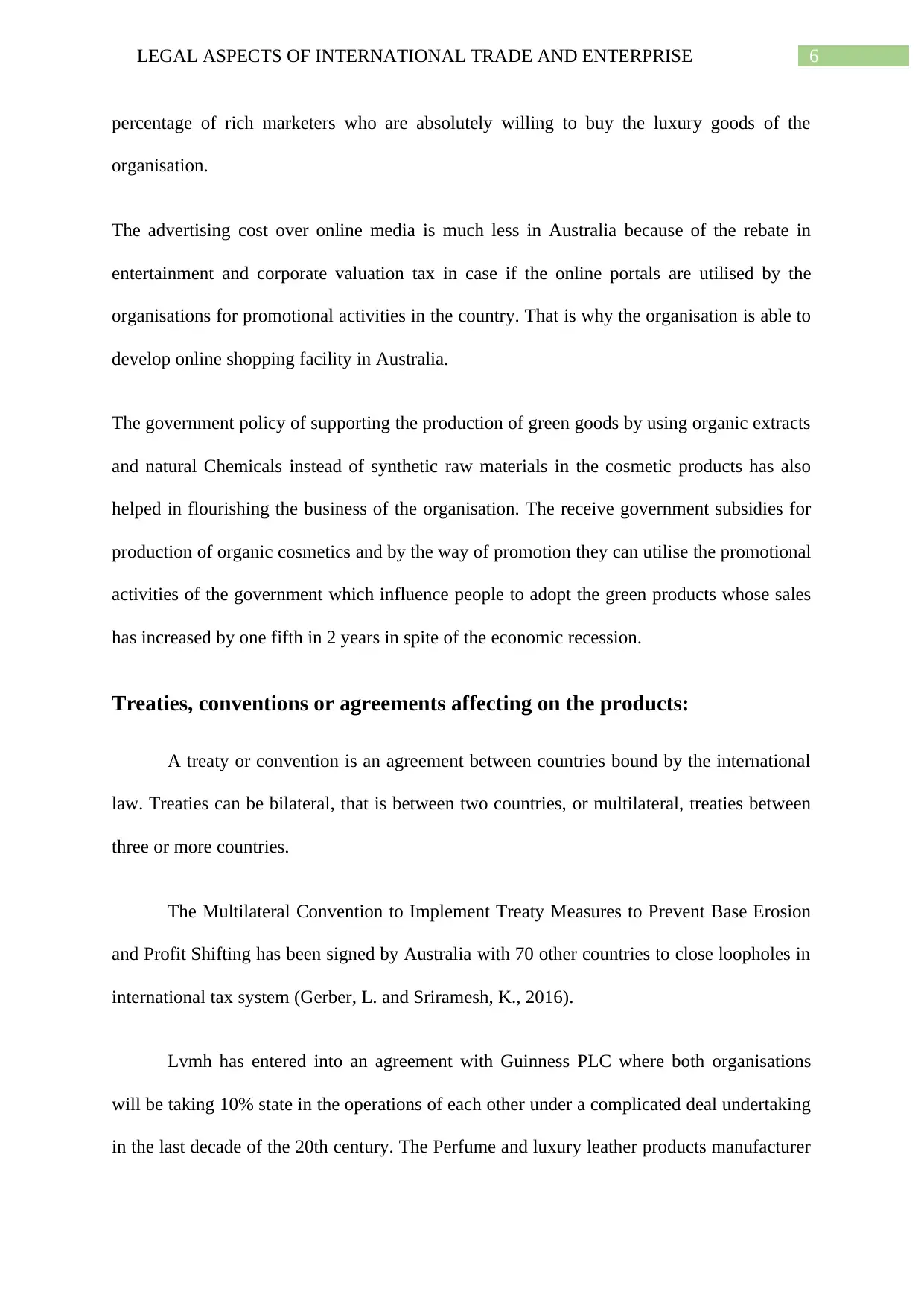
6LEGAL ASPECTS OF INTERNATIONAL TRADE AND ENTERPRISE
percentage of rich marketers who are absolutely willing to buy the luxury goods of the
organisation.
The advertising cost over online media is much less in Australia because of the rebate in
entertainment and corporate valuation tax in case if the online portals are utilised by the
organisations for promotional activities in the country. That is why the organisation is able to
develop online shopping facility in Australia.
The government policy of supporting the production of green goods by using organic extracts
and natural Chemicals instead of synthetic raw materials in the cosmetic products has also
helped in flourishing the business of the organisation. The receive government subsidies for
production of organic cosmetics and by the way of promotion they can utilise the promotional
activities of the government which influence people to adopt the green products whose sales
has increased by one fifth in 2 years in spite of the economic recession.
Treaties, conventions or agreements affecting on the products:
A treaty or convention is an agreement between countries bound by the international
law. Treaties can be bilateral, that is between two countries, or multilateral, treaties between
three or more countries.
The Multilateral Convention to Implement Treaty Measures to Prevent Base Erosion
and Profit Shifting has been signed by Australia with 70 other countries to close loopholes in
international tax system (Gerber, L. and Sriramesh, K., 2016).
Lvmh has entered into an agreement with Guinness PLC where both organisations
will be taking 10% state in the operations of each other under a complicated deal undertaking
in the last decade of the 20th century. The Perfume and luxury leather products manufacturer
percentage of rich marketers who are absolutely willing to buy the luxury goods of the
organisation.
The advertising cost over online media is much less in Australia because of the rebate in
entertainment and corporate valuation tax in case if the online portals are utilised by the
organisations for promotional activities in the country. That is why the organisation is able to
develop online shopping facility in Australia.
The government policy of supporting the production of green goods by using organic extracts
and natural Chemicals instead of synthetic raw materials in the cosmetic products has also
helped in flourishing the business of the organisation. The receive government subsidies for
production of organic cosmetics and by the way of promotion they can utilise the promotional
activities of the government which influence people to adopt the green products whose sales
has increased by one fifth in 2 years in spite of the economic recession.
Treaties, conventions or agreements affecting on the products:
A treaty or convention is an agreement between countries bound by the international
law. Treaties can be bilateral, that is between two countries, or multilateral, treaties between
three or more countries.
The Multilateral Convention to Implement Treaty Measures to Prevent Base Erosion
and Profit Shifting has been signed by Australia with 70 other countries to close loopholes in
international tax system (Gerber, L. and Sriramesh, K., 2016).
Lvmh has entered into an agreement with Guinness PLC where both organisations
will be taking 10% state in the operations of each other under a complicated deal undertaking
in the last decade of the 20th century. The Perfume and luxury leather products manufacturer
Paraphrase This Document
Need a fresh take? Get an instant paraphrase of this document with our AI Paraphraser
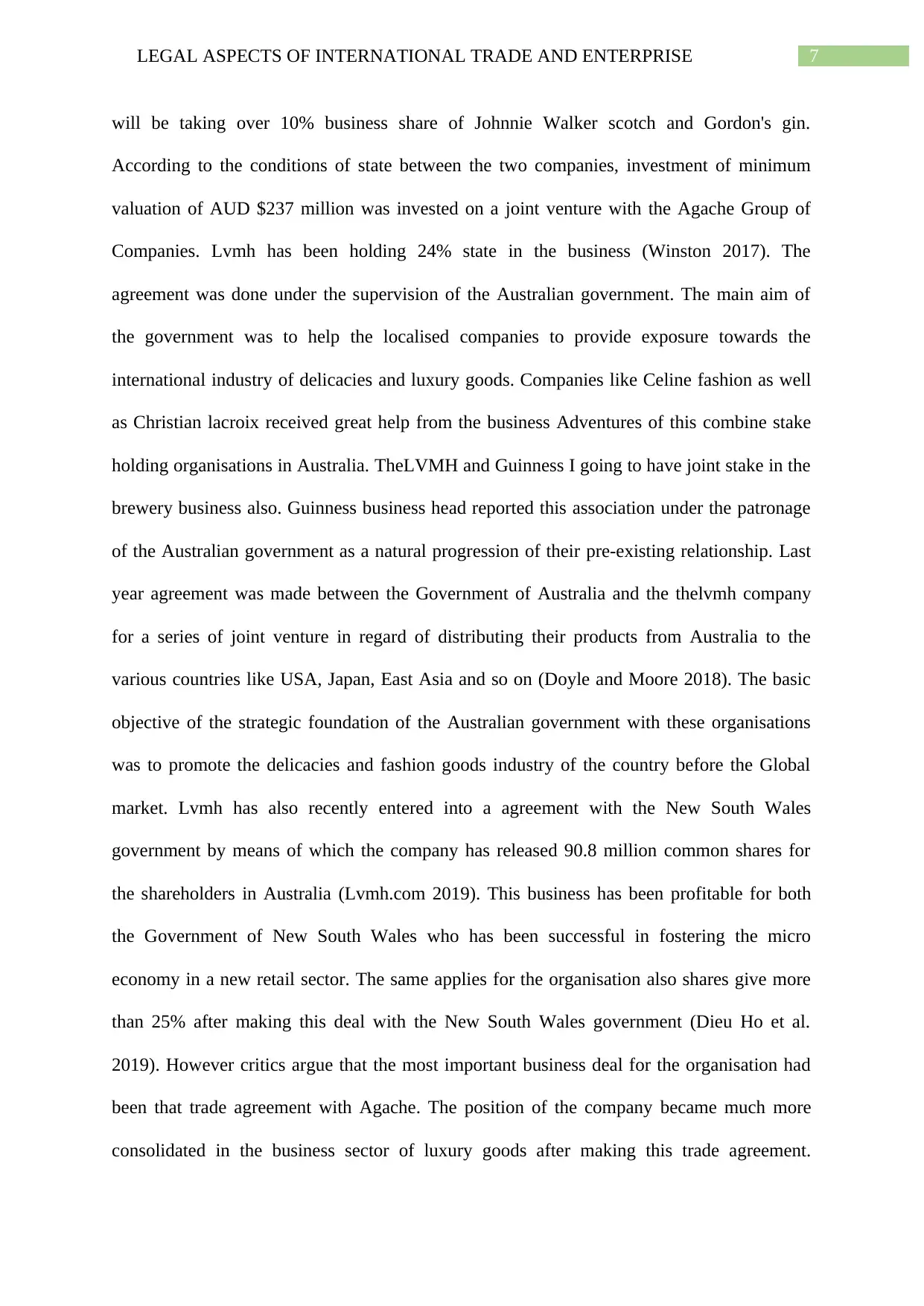
7LEGAL ASPECTS OF INTERNATIONAL TRADE AND ENTERPRISE
will be taking over 10% business share of Johnnie Walker scotch and Gordon's gin.
According to the conditions of state between the two companies, investment of minimum
valuation of AUD $237 million was invested on a joint venture with the Agache Group of
Companies. Lvmh has been holding 24% state in the business (Winston 2017). The
agreement was done under the supervision of the Australian government. The main aim of
the government was to help the localised companies to provide exposure towards the
international industry of delicacies and luxury goods. Companies like Celine fashion as well
as Christian lacroix received great help from the business Adventures of this combine stake
holding organisations in Australia. TheLVMH and Guinness I going to have joint stake in the
brewery business also. Guinness business head reported this association under the patronage
of the Australian government as a natural progression of their pre-existing relationship. Last
year agreement was made between the Government of Australia and the thelvmh company
for a series of joint venture in regard of distributing their products from Australia to the
various countries like USA, Japan, East Asia and so on (Doyle and Moore 2018). The basic
objective of the strategic foundation of the Australian government with these organisations
was to promote the delicacies and fashion goods industry of the country before the Global
market. Lvmh has also recently entered into a agreement with the New South Wales
government by means of which the company has released 90.8 million common shares for
the shareholders in Australia (Lvmh.com 2019). This business has been profitable for both
the Government of New South Wales who has been successful in fostering the micro
economy in a new retail sector. The same applies for the organisation also shares give more
than 25% after making this deal with the New South Wales government (Dieu Ho et al.
2019). However critics argue that the most important business deal for the organisation had
been that trade agreement with Agache. The position of the company became much more
consolidated in the business sector of luxury goods after making this trade agreement.
will be taking over 10% business share of Johnnie Walker scotch and Gordon's gin.
According to the conditions of state between the two companies, investment of minimum
valuation of AUD $237 million was invested on a joint venture with the Agache Group of
Companies. Lvmh has been holding 24% state in the business (Winston 2017). The
agreement was done under the supervision of the Australian government. The main aim of
the government was to help the localised companies to provide exposure towards the
international industry of delicacies and luxury goods. Companies like Celine fashion as well
as Christian lacroix received great help from the business Adventures of this combine stake
holding organisations in Australia. TheLVMH and Guinness I going to have joint stake in the
brewery business also. Guinness business head reported this association under the patronage
of the Australian government as a natural progression of their pre-existing relationship. Last
year agreement was made between the Government of Australia and the thelvmh company
for a series of joint venture in regard of distributing their products from Australia to the
various countries like USA, Japan, East Asia and so on (Doyle and Moore 2018). The basic
objective of the strategic foundation of the Australian government with these organisations
was to promote the delicacies and fashion goods industry of the country before the Global
market. Lvmh has also recently entered into a agreement with the New South Wales
government by means of which the company has released 90.8 million common shares for
the shareholders in Australia (Lvmh.com 2019). This business has been profitable for both
the Government of New South Wales who has been successful in fostering the micro
economy in a new retail sector. The same applies for the organisation also shares give more
than 25% after making this deal with the New South Wales government (Dieu Ho et al.
2019). However critics argue that the most important business deal for the organisation had
been that trade agreement with Agache. The position of the company became much more
consolidated in the business sector of luxury goods after making this trade agreement.
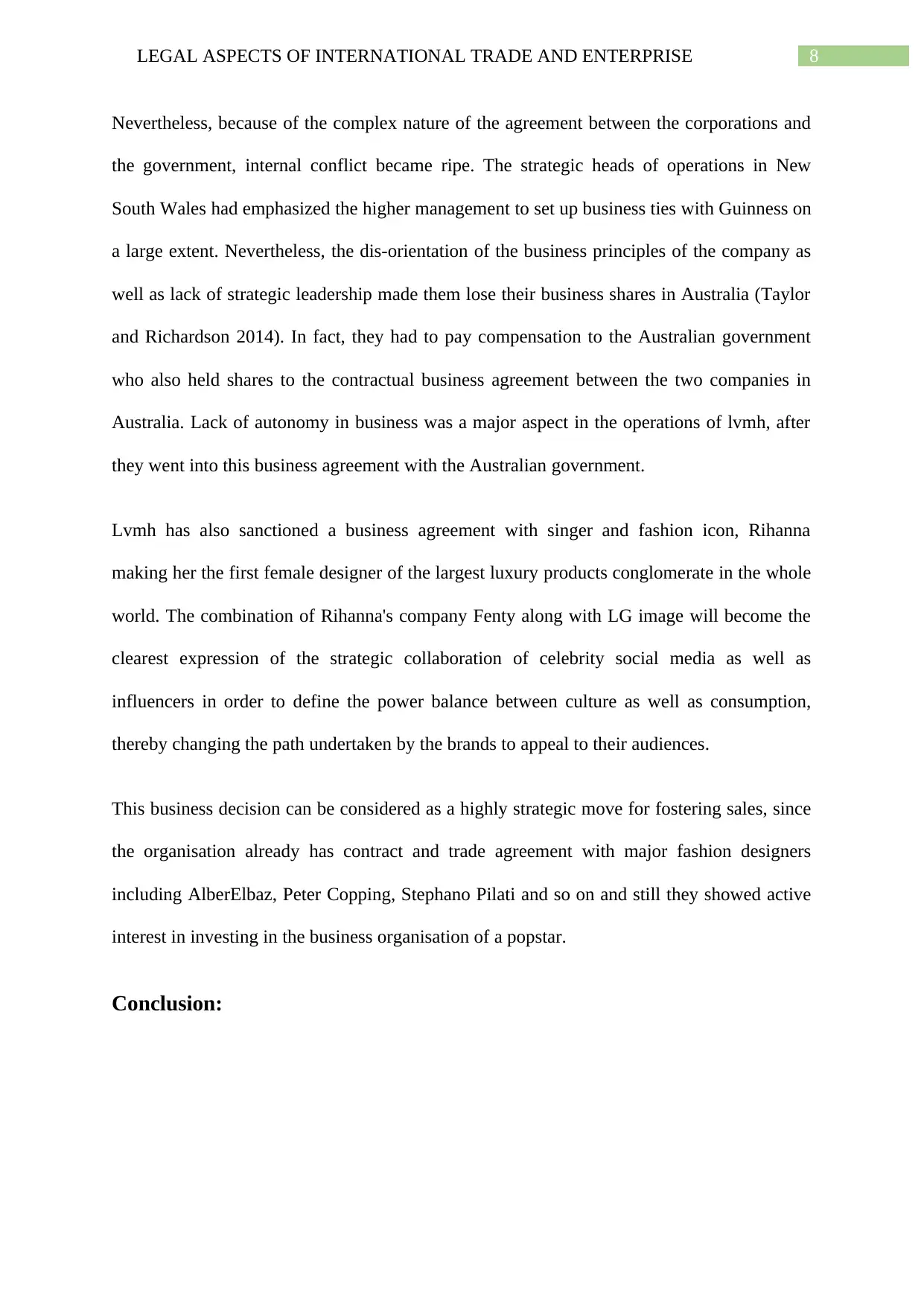
8LEGAL ASPECTS OF INTERNATIONAL TRADE AND ENTERPRISE
Nevertheless, because of the complex nature of the agreement between the corporations and
the government, internal conflict became ripe. The strategic heads of operations in New
South Wales had emphasized the higher management to set up business ties with Guinness on
a large extent. Nevertheless, the dis-orientation of the business principles of the company as
well as lack of strategic leadership made them lose their business shares in Australia (Taylor
and Richardson 2014). In fact, they had to pay compensation to the Australian government
who also held shares to the contractual business agreement between the two companies in
Australia. Lack of autonomy in business was a major aspect in the operations of lvmh, after
they went into this business agreement with the Australian government.
Lvmh has also sanctioned a business agreement with singer and fashion icon, Rihanna
making her the first female designer of the largest luxury products conglomerate in the whole
world. The combination of Rihanna's company Fenty along with LG image will become the
clearest expression of the strategic collaboration of celebrity social media as well as
influencers in order to define the power balance between culture as well as consumption,
thereby changing the path undertaken by the brands to appeal to their audiences.
This business decision can be considered as a highly strategic move for fostering sales, since
the organisation already has contract and trade agreement with major fashion designers
including AlberElbaz, Peter Copping, Stephano Pilati and so on and still they showed active
interest in investing in the business organisation of a popstar.
Conclusion:
Nevertheless, because of the complex nature of the agreement between the corporations and
the government, internal conflict became ripe. The strategic heads of operations in New
South Wales had emphasized the higher management to set up business ties with Guinness on
a large extent. Nevertheless, the dis-orientation of the business principles of the company as
well as lack of strategic leadership made them lose their business shares in Australia (Taylor
and Richardson 2014). In fact, they had to pay compensation to the Australian government
who also held shares to the contractual business agreement between the two companies in
Australia. Lack of autonomy in business was a major aspect in the operations of lvmh, after
they went into this business agreement with the Australian government.
Lvmh has also sanctioned a business agreement with singer and fashion icon, Rihanna
making her the first female designer of the largest luxury products conglomerate in the whole
world. The combination of Rihanna's company Fenty along with LG image will become the
clearest expression of the strategic collaboration of celebrity social media as well as
influencers in order to define the power balance between culture as well as consumption,
thereby changing the path undertaken by the brands to appeal to their audiences.
This business decision can be considered as a highly strategic move for fostering sales, since
the organisation already has contract and trade agreement with major fashion designers
including AlberElbaz, Peter Copping, Stephano Pilati and so on and still they showed active
interest in investing in the business organisation of a popstar.
Conclusion:
⊘ This is a preview!⊘
Do you want full access?
Subscribe today to unlock all pages.

Trusted by 1+ million students worldwide
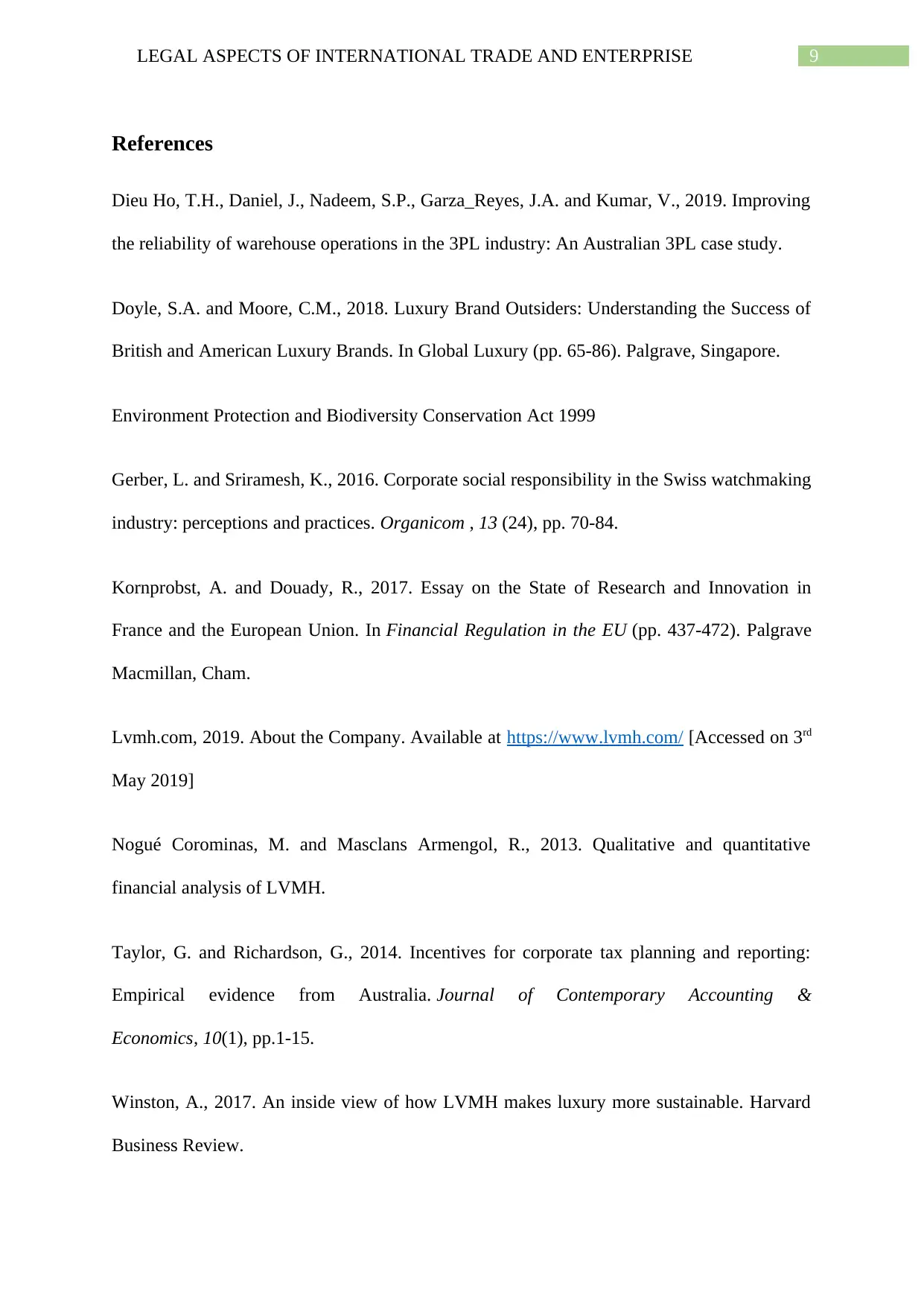
9LEGAL ASPECTS OF INTERNATIONAL TRADE AND ENTERPRISE
References
Dieu Ho, T.H., Daniel, J., Nadeem, S.P., Garza_Reyes, J.A. and Kumar, V., 2019. Improving
the reliability of warehouse operations in the 3PL industry: An Australian 3PL case study.
Doyle, S.A. and Moore, C.M., 2018. Luxury Brand Outsiders: Understanding the Success of
British and American Luxury Brands. In Global Luxury (pp. 65-86). Palgrave, Singapore.
Environment Protection and Biodiversity Conservation Act 1999
Gerber, L. and Sriramesh, K., 2016. Corporate social responsibility in the Swiss watchmaking
industry: perceptions and practices. Organicom , 13 (24), pp. 70-84.
Kornprobst, A. and Douady, R., 2017. Essay on the State of Research and Innovation in
France and the European Union. In Financial Regulation in the EU (pp. 437-472). Palgrave
Macmillan, Cham.
Lvmh.com, 2019. About the Company. Available at https://www.lvmh.com/ [Accessed on 3rd
May 2019]
Nogué Corominas, M. and Masclans Armengol, R., 2013. Qualitative and quantitative
financial analysis of LVMH.
Taylor, G. and Richardson, G., 2014. Incentives for corporate tax planning and reporting:
Empirical evidence from Australia. Journal of Contemporary Accounting &
Economics, 10(1), pp.1-15.
Winston, A., 2017. An inside view of how LVMH makes luxury more sustainable. Harvard
Business Review.
References
Dieu Ho, T.H., Daniel, J., Nadeem, S.P., Garza_Reyes, J.A. and Kumar, V., 2019. Improving
the reliability of warehouse operations in the 3PL industry: An Australian 3PL case study.
Doyle, S.A. and Moore, C.M., 2018. Luxury Brand Outsiders: Understanding the Success of
British and American Luxury Brands. In Global Luxury (pp. 65-86). Palgrave, Singapore.
Environment Protection and Biodiversity Conservation Act 1999
Gerber, L. and Sriramesh, K., 2016. Corporate social responsibility in the Swiss watchmaking
industry: perceptions and practices. Organicom , 13 (24), pp. 70-84.
Kornprobst, A. and Douady, R., 2017. Essay on the State of Research and Innovation in
France and the European Union. In Financial Regulation in the EU (pp. 437-472). Palgrave
Macmillan, Cham.
Lvmh.com, 2019. About the Company. Available at https://www.lvmh.com/ [Accessed on 3rd
May 2019]
Nogué Corominas, M. and Masclans Armengol, R., 2013. Qualitative and quantitative
financial analysis of LVMH.
Taylor, G. and Richardson, G., 2014. Incentives for corporate tax planning and reporting:
Empirical evidence from Australia. Journal of Contemporary Accounting &
Economics, 10(1), pp.1-15.
Winston, A., 2017. An inside view of how LVMH makes luxury more sustainable. Harvard
Business Review.
Paraphrase This Document
Need a fresh take? Get an instant paraphrase of this document with our AI Paraphraser
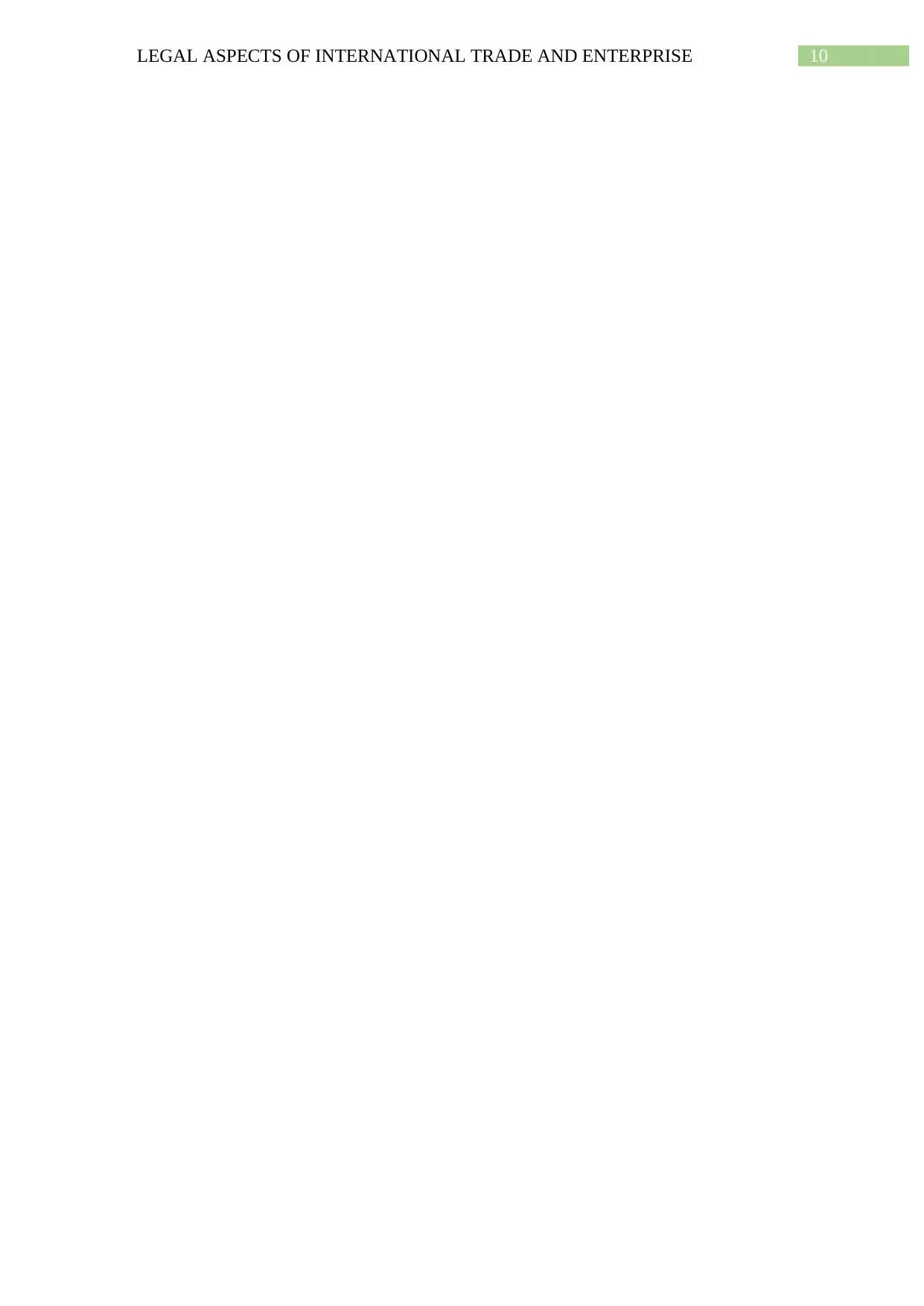
10LEGAL ASPECTS OF INTERNATIONAL TRADE AND ENTERPRISE
1 out of 11
Related Documents
Your All-in-One AI-Powered Toolkit for Academic Success.
+13062052269
info@desklib.com
Available 24*7 on WhatsApp / Email
![[object Object]](/_next/static/media/star-bottom.7253800d.svg)
Unlock your academic potential
Copyright © 2020–2026 A2Z Services. All Rights Reserved. Developed and managed by ZUCOL.





